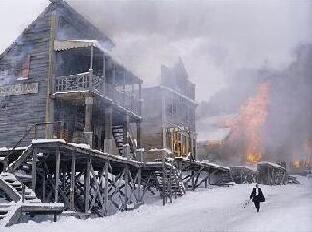The Claim
reviewed by Dan heaton
 Traveling through a chaotic blizzard, a battered young
pioneer and his fragile wife and daughter battle the
elements and seek shelter in a rickety old cabin. The
man desperately seeks gold, but his luck is fleeting
and his family is struggling with the disastrous
weather. With shocking quickness, he makes a startling
decision that will change his life and haunt him
forever. This choice destroys his emotional bonds, but
it also indirectly leads to the creation of Kingdom
Come, a prosperous Western town located within the
wild, barren landscape of the Sierra Nevada Mountains.
Traveling through a chaotic blizzard, a battered young
pioneer and his fragile wife and daughter battle the
elements and seek shelter in a rickety old cabin. The
man desperately seeks gold, but his luck is fleeting
and his family is struggling with the disastrous
weather. With shocking quickness, he makes a startling
decision that will change his life and haunt him
forever. This choice destroys his emotional bonds, but
it also indirectly leads to the creation of Kingdom
Come, a prosperous Western town located within the
wild, barren landscape of the Sierra Nevada Mountains.
The Claim begins in Kingdom Come with the arrival of Mr. Dalglish (Wes Bentley of American Beauty), a railroad employee searching for a path for the Trans-Continental Railroad. A relatively small but extremely confident man, he enters the town with his band of workers and receives all the perks available to try and draw the tracks near this settlement. They're given a place to stay, necessary supplies, and their choice of women at the local bordello. In this glorious time of Western expansion, towns live and die based on their proximity to the railroad, and Kingdom Come needs the railroad to thrive and grow in the future.
Directed by Michael Winterbottom (Jude, Wonderland), this film concentrates on the harsh realities of life amid the beautiful mountainous landscape. Although the "civilized" town appears to have little in common with the typical dirty, brutal sites of this genre, it still contains the unfortunate degradation and conflicts inherent in human nature. Although the railroad may signify the arrival of civilization to the Old West, it can't remove the violence and selfishness from the hearts of people. Winterbottom deftly uses a smaller family story to explore the life of this land following the era of gold-mining pioneers. In a similar vein to Wonderland, he connects the lives of troubled characters through a unique setting. Although that film takes place in working-class England, it relates to this story through his straightforward, unblinking look at the struggles within each person's mind.
 Mr. Dillon (Peter Mullan) controls all aspects of
Kingdom Come with swift precision and fairness. A man
of abundant wealth, he resides in a gaudy Victorian
house filled with items from all corners of the globe.
His brand of justice discourages further infractions
through brutal horse whippings in front of the entire
town. Firearms aren't allowed in the city limits, and
people live relatively peaceful lives, but Dillon's
power can also draw ire and resentment. Although he
stands at the head of the town, its residents follow
him not out of respect, but out of fear of his
retribution. By his side is the stunning Lucia (Mila
Jovavich), a refined woman who cares deeply for
Dillon. Unfortunately, a dark cloud hangs over his
past, and it springs to the forefront with the arrival
of frail Elena (Natasha Kinski) and her daughter Hope
(Sarah Polley). Their connection to his troubled youth
haunts Dillon and could lead to disastrous
consequences.
Mr. Dillon (Peter Mullan) controls all aspects of
Kingdom Come with swift precision and fairness. A man
of abundant wealth, he resides in a gaudy Victorian
house filled with items from all corners of the globe.
His brand of justice discourages further infractions
through brutal horse whippings in front of the entire
town. Firearms aren't allowed in the city limits, and
people live relatively peaceful lives, but Dillon's
power can also draw ire and resentment. Although he
stands at the head of the town, its residents follow
him not out of respect, but out of fear of his
retribution. By his side is the stunning Lucia (Mila
Jovavich), a refined woman who cares deeply for
Dillon. Unfortunately, a dark cloud hangs over his
past, and it springs to the forefront with the arrival
of frail Elena (Natasha Kinski) and her daughter Hope
(Sarah Polley). Their connection to his troubled youth
haunts Dillon and could lead to disastrous
consequences.
Although Dalglish is a well-traveled man of the world, his eyes begin to fall upon innocent young Hope. Bentley and Polley possess a nice chemistry, but their moments lack the force of Dillon's story. This is due largely to the impressive presence of Peter Mullan (My Name is Joe), who gives a remarkable performance of startling complexity. Dillon originally appears to be the villain of the piece, but he brings life and emotion to a character that could inspire only hatred. Although his past will haunt him forever, he attempts to overcome his prior decisions through caring and use of his considerable power and wealth. Also, the town really has benefited from Dillon's actions and become more prosperous as a result. Mullan uses his tense facial expressions while he strolls through the streets to show the gigantic weight that remains on his shoulders each day. Even while Dillon charms Lucia with his handsome visage, they remain separate on an emotional level because of the gap produced by his tragic past.
Based on the 1886 British novel The Mayor of Casterbridge by Thomas Hardy, The Claim drastically changes the setting to the Old West and makes it a modern tale. This type of story could occur anywhere during various time periods, but the decision to convert it to a Western adds themes about the American past and the effects of massive expansion. In order to become successful amid this landscape, did men have to reject their families and emotions? Near the end of this film, Dalglish faces a similar crisis in his burgeoning relationship with Hope. With the final shots, Winterbottom offers no easy explanations and leaves the possibilities ambiguous. It appears that at least a slight bit of hope exists, but the tragedy could repeat itself again in a new setting.
Copyright (c) 2005 erasing clouds |
|